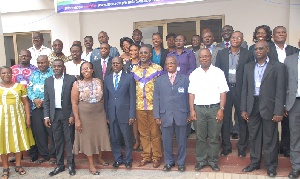The second phase of a training programme for Heads of Departments (HODs) in the public and private universities in the country, has ended in Accra, with a call on the HODs to contribute more to the progress of their institutions.
Dubbed, “Senior Academic Leadership Training (SALT),” the programme aimed at training 240 tertiary departmental heads by the end of next year for them to upgrade their leadership skills for effective administration of the departments.
The SALT, being rolled out under the auspices of the National Council for Tertiary Education (NCTE), with funding from the Carnegie Corporation in New York, is the second in series of training conducted for university authorities after Vice Chancellors, Pro Vice Chancellors and Deans undertook a similar training three years ago to upgrade their leadership competences.
The co-ordinator of the SALT and former Executive Director of the NCTE, Dr. Paul Effah, speaking to The Ghanaian Times after the training, said the council took the training initiative after an assessment of the performance of the tertiary heads, showed inadequacies in their leadership capacities for good governance, research, financial administration and quality assurance.
He said “the departments are the knowledge cells and heartbeat of the university. The departments are the university and they are where everything begins.”
Equipping the heads with current trends of leadership skills, he said, was in the interest of the departments for a holistic progress of the schools since their expertise would be brought to bear on their departments.
According to him, 80 per cent of activities involved in running tertiary institutions start from the departments, adding that there was therefore need to upgrade their knowledge base in leadership.
“They are so crucial that we cannot do away with them. Their leadership skills need to be upgraded,” he stressed.
In an earlier presentation, Dr. Effah, currently the President of Radford University College in Accra, urged the participants to adhere to the spirit of transparency to enable them to deliver on their mandates.
As “Chief Knowledge Officers”, Dr. Effah impressed on them to be listening leaders by giving voice to their subordinates who assist them in the administration of the departments.
He challenged them to keep track of teaching by lecturers at their departments and desist from being arm chair HODs and become action oriented ones.
He urged them to be fair in their decisions, especially in times of conflicts among subordinates, reprimand and give credit when it was due.
The leadership training and skills gained at such conferences, Dr. Effah said was worth sharing with their staff members in order to prepare them for future leadership roles in their absence.
“A successful leader without a successor is a failure. You don’t lead the way to block the way. You must train people to succeed you when your time is due” he stated.
The participants were taken through topics like Preparing to be HOD, Leading and Managing Research, Roles and Responsibilities of HODs, Budgeting and Managing the Finances of the Department among others.
Regional News of Friday, 28 August 2015
Source: ghanaiantimes.com.gh













